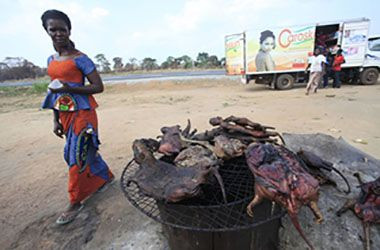Ebola Is Terrifying, But It Kills Far, Far Fewer People Than These Other Diseases

The Ebola outbreak in the West African nation of Guinea is making headlines around the world, as the vicious disease’s death toll slowly climbs. As of Monday the Guinean outbreak had infected 122 people, killing 78 of them, Doctors Without Borders reported. But Ebola is by no means among the most dire global health threats. It has killed far fewer people than many other diseases, and outbreaks generally strike a limited geographic area for a relatively short period of time before being eliminated.
That hasn't made Ebola, a hemorrhagic fever with no cure that kills gruesomely the majority of those it infects, any less feared.
Countless articles have been written about the supposed potential of a scourge of Ebola. Hit movies and best-selling books from “The Hot Zone” to “Outbreak” play on these fears, leaving people terrified that Ebola will kill millions in gruesome fashion.
But the truth is that there are many far more common diseases that have claimed hundreds of times as many lives as Ebola, and the chance that that will change anytime soon is highly unlikely, according to leading experts.
In comparison, another hemorrhagic fever called Lassa fever is “endemic in parts of West Africa including Sierra Leone, Liberia, Guinea and Nigeria,” where it infects between 300,000 and 500,000 people and kills about 5,000 each year, according to the Centers for Disease Control and Prevention. And just in 2012, an estimated 5,100 people died of AIDS in Guinea alone, according to UNAIDS, the Joint United Nations Programme on HIV/AIDS.
“Ebola virus is one of the things that keep public health officials up at night,” Dr. Ben Neuman, a virologist at the University of Reading, said. “If this virus was able to spread between people more easily than it currently does, it would have the potential to be more deadly than the black plague. But currently it is not.”
Ebola victims have a 25 to 90 percent chance of dying from the disease, but they have a limited chance of getting it in the first place, experts like Jonathan Ball, a professor of molecular virology at the University of Nottingham, say.
“It’s worth remembering that this isn’t the most infectious virus,” Ball said. “Those most at risk are close contacts and healthcare workers, but basic precautions -- good hygiene and use of personal protective equipment -- are effective in stopping the spread.”
Ebola is not an airborne illness like influenza, or one that can be easily transmitted in its early stages. Contact with a person in the advanced stages of the illness or a corpse of someone who succumbed to the disease are the main ways it spreads.
Add to that the fact that there are effective procedures to end Ebola outbreaks that have worked to great effect since the disease was first identified in 1976, and that appear to be on the road to ending the current one in Guinea soon, and it becomes clear why Ebola has such a surprising low death toll.
“If you look at the total number of cases that have occurred over that period since 1976, it’s somewhere around 2,200 cases,” Dr. Anthony S. Fauci, director of the National Institute of Allergy and Infectious Diseases at the National Institutes of Health, said. “Relatively speaking that’s a small number, of those about 1,500 have died to give it a 60 percent total mortality.”
But the enduring popular mythology that Ebola will take over the world like a zombie apocalypse does serve a purpose, as it generates media attention that helps efforts to contain outbreaks, according to Fauci.
“The publicity that’s associated with this is a good thing even though it’s scaring some people, because it makes people aware,” he said.
© Copyright IBTimes 2025. All rights reserved.





















